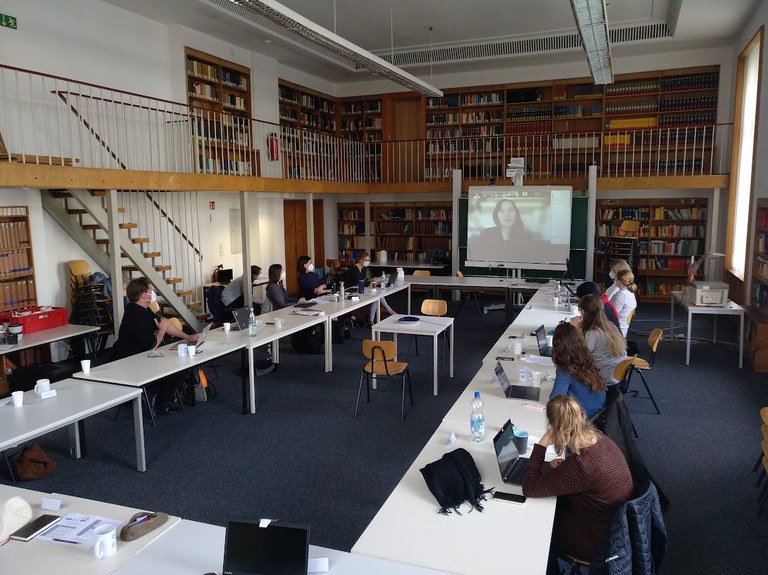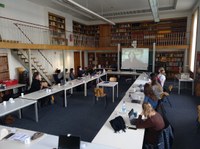
How can asylum law and courts be studied?
At a workshop at Humboldt-Universität zu Berlin, researchers discussed different disciplinary approaches to the study of asylum law and courts in preparation of a Special Issue of the German Journal of Forced Migration and Refugee Studies (Zeitschrift für Flucht- und Flüchtlingsforschung – Z’Flucht).
The study of asylum law and its practical implementation at court in a multi- or even interdisciplinary way greatly benefits from the assembly of a variety of disciplinary voices and hearing their dialogue. To achieve this, Valentin Feneberg and Petra Sußner (both of Humboldt-Universität zu Berlin) organised a workshop entitled Flucht vor Recht – Flucht ins Recht? Empirisch-interdisziplinäre Asylrechtsforschung am Schauplatz Gericht (Fleeing from law – fleeing to law? Empirical and interdisciplinary research on asylum law and courts) at the Integrative Research Institute Law & Society (LSI) Berlin on 30 September & 1 October 2021. The event was co-hosted by Olaf Kleist and Zeynep Yanasmayan (German Center for Integration and Migration Research, DeZIM), the ‘Politics and Law’ research group of the German Political Science Association (DVPW), and the 'Refugee Law' research group of the German Network for Forced Migration Studies. For many participants, it was the first in-person workshop after one and a half years of Covid-induced physical distancing, and thus an ideal occasion for in-depth exchange and discussion of the topic. The manuscripts presented at the workshop will form the basis of a special issue of the German Journal of Forced Migration and Refugee Studies (Zeitschrift für Flucht- und Flüchtlingsforschung – Z’Flucht).
In their keynote, Cathryn Costello and Jessica Breaugh from the Centre for Fundamental Rights at the Hertie School in Berlin discussed the empirical study of refugee recognition processes and the particular challenges of studying UNHCR mandate Refugee Status Determination (RSD). On then one hand, they introduced surveys of decision-makers and others as a data source in general, and the research design of the RegMig survey examining the workings of UNHCR mandate RSD, on the other. The latter aims to shed light to the – so far understudied – practices of UNHCR, acknowledging the practical and normative importance of this institution for refugee recognition globally.
Johanna Günther (University of Hildesheim) and Lena Riemer (Yale University) both approached the case law of the European Court of Human Rights (ECtHR) from different disciplinary and methodological angles. Johanna Günther analysed the impact of the ECtHR on European asylum policy from a political science point of view, showing how the decision in M.S.S. v. Belgium and Greece on the prohibition of torture influenced changes to the Dublin system of the European Union. Conducting a mainly doctrinal approach, Lena Riemer set out how the interpretation of the collective expulsion prohibition by the ECtHR changed during the last decade to a more regressive approach, culminating in 2020 in its N.D. and N.T. v. Spain judgment on Spain’s policy of ‘hot returns’. Although using different methodological toolkits, both papers consider the court as embedded in a broader institutional setting which needs to be considered in order to evaluate the role of courts beyond individual decisions.
Nicole Hoellerer and Nick Gill from the ASYFAIR project at the University of Exeter shared their vast experiences of asylum courts as ethnographic research sites. Together with their colleagues from their project, they observed more than 450 court hearings in five European countries. They discussed the utility of legal ethnography at asylum appeal courts, the challenges of ethnographic research at some of them, as well as the advantages and disadvantages of such an approach. Their research demonstrates that one must literally enter the ‘black box’ of court to see how the law works in practice and to do justice both to those who apply it and those who are affected by it.
Taking into account the context of the work of courts, Constantin Hruschka (MPI for Social Law and Social Policy) shared his analysis of the ‘legislative hyperactivity’ in Germany, where, since 2014/2015, the German legislature has adopted more than 35 amendments to the Residence and Asylum Act. The analysis focussed on the link between these changes and the underlying migration management framework, describing a turn from an inclusionary to an exclusionary legal framework, emphasising the return of migrants and securitization instead of integration and asylum seekers’ well-being.
The ‘summer of migration’ of 2015 did not only lead to crucial legislative changes but also fostered the development of Refugee Law Clinics in Germany. In their paper, Mailin Loock and Sophie Greilich (both University of Hamburg) connected this development with the emergence of Law Clinics in other countries and discussed how these organisations could contribute to asylum seekers’ access to rights, as well as in how far they have the potential to generate valuable synergies by linking academia, practice and civil society.
Janna Wessels (Vrije Universiteit Amsterdam) contributed a workshop-in-a-workshop on discourse analysis of legal doctrine in refugee law research, using her work on so-called ‘discretion reasoning’ (recently published with Cambridge University Press) as a case study. Following an introduction to discourse analysis, participants were asked to read and discuss case law from France, Germany and the UK, and to identify ‘discretion reasoning’ by courts and the form in which it appears. The exercise revealed how differently courts argue when it comes to acts and the ‘identity’ of claimants applying for asylum based on persecution due to their sexual orientation, and showed how doctrinal reasoning can be deconstructed by applying discourse analysis, and why this method can be an important extension to doctrinal and content analysis.
In sum, the workshop confirmed that the study of the “plurality of interpretative voices” (Costello 2015) in the asylum regime requires a plurality of disciplinary perspectives, but also highlighted the challenge of developing a truly inter-disciplinary approach which is more than just a juxtaposition of these perspectives. In an ongoing dialogue between editors and authors, further work on the Special Issue will address this challenge and seek answers to questions that the workshop brought to light but could not yet fully answer.


